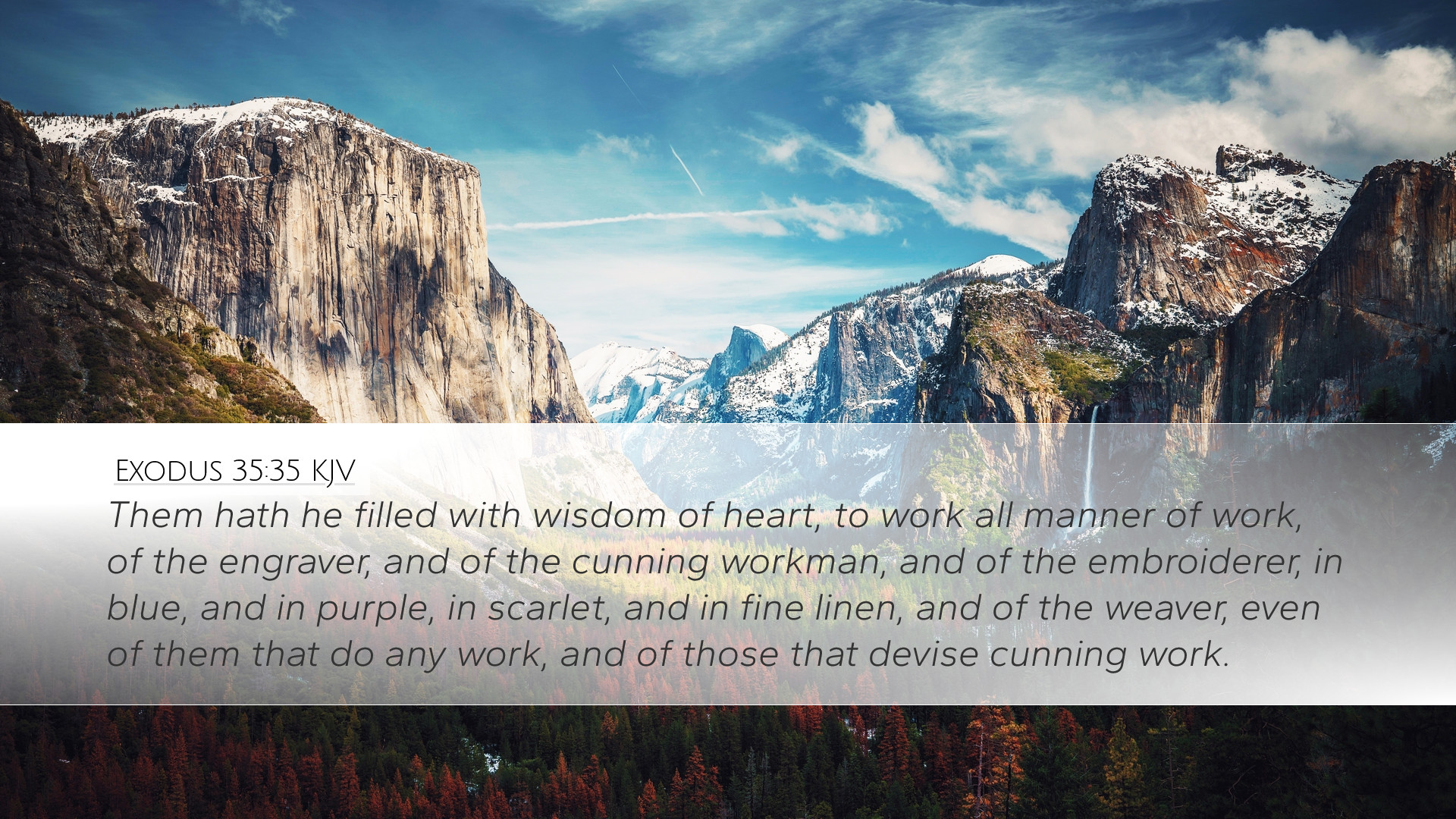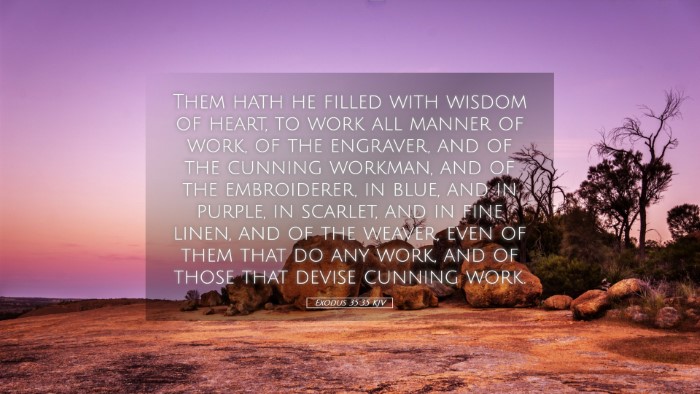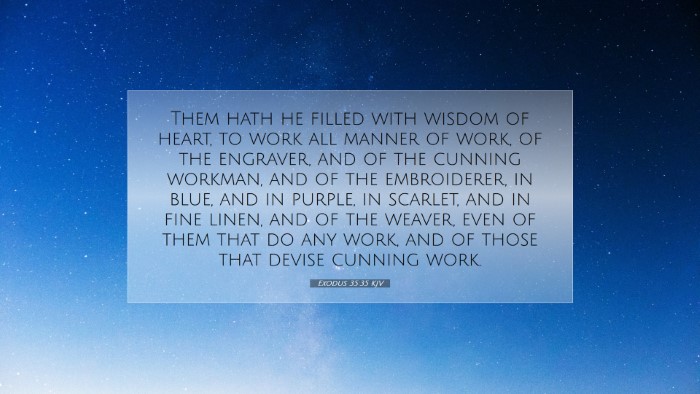Exodus 35:35 - Commentary
Verse: Exodus 35:35 - "Them hath he filled with wisdom of heart, to work all manner of work, of the engraver, and of the cunning workman, and of the weaver, even of them that do any work, and of those that devise cunning works."
Introduction
Exodus 35:35 encapsulates a moment of divine inspiration where God bestows wisdom and skill upon specific individuals for the purpose of constructing the tabernacle and its furnishings. This verse highlights the significance of art and craftsmanship within the context of divine service, making it a pivotal commentary for understanding the intersection of faith and vocation.
Commentary from Matthew Henry
Matthew Henry emphasizes that God equips those He calls with the necessary skills and wisdom to fulfill their divine tasks. He notes:
"It is the great Creator that gives wisdom and understanding, both to invent and to execute."
The laborers are not merely artisans; they are divinely inspired creators. Henry illustrates how every detail of the work in the tabernacle was essential, thereby affirming the dignity of all work done heartily for God’s glory, irrespective of its nature.
The Divine Bestowal of Skills
Henry points out that the artisans filled with wisdom signify God's direct intervention in enabling human skill. He reflects on how divine wisdom is indispensable for those engaging in significant tasks, suggesting that recognition of God’s gifts should lead to a humble acknowledgement of our dependence on Him:
- Wisdom as a Gift: The wisdom bestowed serves as a reminder that all abilities come from God.
- Purposeful Craftsmanship: The work done is for a divine purpose, not merely for human aesthetics.
- Collective Contribution: Each worker's contribution is valuable in the tapestry of the entire project.
Insight from Albert Barnes
Albert Barnes provides additional insights by noting that the term "wisdom of heart" not only refers to skill but also to a deeper understanding and insight into the nature of the tasks they were performing. Barnes suggests that these builders were inspired and guided by the Holy Spirit, leading to extraordinary creativity:
- Spiritual Empowerment: The empowerment of these workers indicates the sacredness of their work. Barnes writes, "It is by the influence of the Spirit of God upon their hearts that they are rendered fit for the work."
- Divine Order: This empowerment reflects God’s order in equipping His people to accomplish His will, serving as an inspiration for contemporary craftsmen and artists within the church.
- Artistry in Worship: Barnes further articulates, "They were to work all manner of work," underlining the importance of various forms of artistic expression in worship.
The Importance of Intentions
Barnes also emphasizes the necessity of intention behind every act of craftsmanship. The work is not merely for the sake of art, but for glorifying God:
- Motive Matters: The intent behind creating beauty for God is paramount. Artists and servants should continually evaluate their motives.
- Inspiration to Modern Believers: Modern artisans are encouraged to seek divine guidance in their craft, echoing the biblical principle that true artistry is inspired by God.
Pursuits in Adam Clarke's Commentary
Adam Clarke provides a broader perspective of the text, focusing on the community aspect of working together towards a common good. He notes that various skills are essential in working harmoniously towards the same divine goal:
- Unity in Diversity: Each worker had unique gifts, reflecting the body of Christ where each member plays a distinctive role.
- God’s Purpose for Each Talent: Clarke points out that every artisan’s skill was necessary, signifying that no one is insignificant in God's plan.
- Encouraging Collaborative Efforts: Clarke's interpretation encourages congregations to appreciate and utilize the diverse gifts within the body of Christ to build collectively.
Application to the Church
Clarke closes with strong encouragement for today’s church leaders and members to foster environments where individual talents are recognized and employed. The collaborative efforts of all believers create a more vibrant and effective community of worshipers:
- Equip the Saints: There should be a conscious effort to equip and empower members to serve in their giftedness.
- Celebrate Creativity: Church should celebrate artistic endeavors as a form of praise, recognizing them as critical to the worship experience.
- Engagement in Good Works: This verse is a call for all believers to engage actively in works that honor God, using their unique gifts as an offering.
Conclusion
The reflections on Exodus 35:35 from Henry, Barnes, and Clarke weave a rich tapestry of meaning that extends beyond the crafting of the tabernacle. They challenge pastors, students, theologians, and scholars to recognize the divine hand in all creativity and craftsmanship, urging a reverent approach to the arts within worship and community. This verse encapsulates the essence of divine involvement in human endeavors, underscoring that every act performed in faith is intrinsically valuable and necessary for God’s kingdom.


